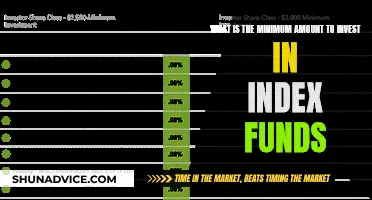
Arbitrage funds are a type of mutual fund that profits from the price differential of equities in the cash market and derivatives. They are considered a low-risk investment option as they generate returns through the purchase and sale of securities in different markets to take advantage of price mismatches. These funds are suitable for investors with a short to medium-term investment horizon of 3 to 5 years.
Arbitrage funds are taxed as equity funds, which means that if you hold the funds for more than a year, they will be taxed as long-term capital gains. Before investing in arbitrage funds, it is important to consider factors such as financial goals, fund performance, fund house and management, and costs involved.
| Characteristics | Values |
|---|---|
| Definition | Arbitrage funds are a type of mutual fund that profit from the price differential of equities in the cash market and derivatives to generate returns. |
| Advantage | Arbitrage funds are suitable for investors with a short to medium-term horizon of 3 to 5 years. |
| Taxation | Arbitrage funds are taxed as equity funds. If held for more than a year, they are taxed as long-term capital gains. |
| Risk | Arbitrage funds are low-risk investments, but they are not 100% risk-free. |
| Returns | Arbitrage funds have delivered an average return of 5.68% over the past year and 5.75% over the past three years. |
| Volatility | Volatile markets provide greater opportunities for arbitrage funds to exploit mis-pricing and outperform liquid funds. |
| Investment Horizon | Arbitrage funds may be suitable for investors with a short to medium-term investment horizon. |
| Fund Performance | Arbitrage funds perform well during market volatility but may underperform in a stable market. |
| Fund House & Management | Fund houses and fund managers play a crucial role in asset allocation and stock selection. |
| Costs Involved | Arbitrage funds generally have a higher expense ratio due to the higher number of trades required. |
What You'll Learn

Arbitrage funds are a type of mutual fund
Arbitrage funds are a type of hybrid fund, but they are often considered to be purely equity funds because they invest majorly in buying equities. They take advantage of the price differential of equities in the cash market and derivatives to generate returns. They buy securities from the stock market and sell them on futures contracts in the derivatives market at a higher price to generate profit from the transaction.
The two markets where arbitrage funds deal primarily are the cash (stock) market and the futures (derivatives) market. The cash market is where stock trading occurs, and the current price at which a share is bought is the spot price. The futures market, on the other hand, is a derivative market where stocks are valued based on an anticipated future price.
Arbitrage funds are considered low-risk investments, often compared to debt funds. They are suitable for investors with a short to medium-term horizon of 3 to 5 years. They are also a good option for those in the highest tax bracket as they are taxed as equity funds, which can be more tax-efficient than debt funds in the short term.
When investing in arbitrage funds, it is important to consider factors such as financial goals, fund performance, fund house and management, and costs involved.
Investing in Commodities: A Smart Fund Move?
You may want to see also

They profit from price differentials in the cash and derivatives markets
Arbitrage funds profit from price differentials in the cash and derivatives markets by buying low in one market and selling high in another. This is known as arbitrage, which is the simultaneous purchase and sale of the same or similar assets in different markets to profit from tiny differences in the asset's listed price.
For example, a fund manager might identify a security trading at a lower price in the cash market and then sell an equivalent amount of that security in the derivatives market at a higher price. This allows the fund to lock in a risk-free profit, which is the difference between the buying and selling prices of the security.
Arbitrage funds are considered low-risk investments because they seek to take advantage of price discrepancies rather than market direction. They are also classified as hybrid funds because they hold a mix of equity (stocks) and debt instruments.
The returns generated by arbitrage funds depend on the volatility of the stock market. In times of high or persistent volatility, these funds can offer relatively risk-free returns to investors. However, it is important to note that arbitrage funds are not 100% risk-free, and the returns can be unpredictable as they depend on market inefficiencies, which may not always be available.
Mutual Fund Investments: Reporting 1099-INT Details
You may want to see also

They are suitable for investors with a short-term horizon
Arbitrage funds are suitable for investors with a short-term horizon, typically ranging from three months to three years. These funds are particularly attractive to investors with a low-risk tolerance due to their minimal risk and the fact that they thrive in volatile markets.
Arbitrage funds are a type of mutual fund that leverages the price difference between two markets, such as the cash and futures markets, to generate returns. They are considered a low-risk investment option because the fund manager simultaneously buys and sells securities, eliminating the risks associated with long-term investing.
For investors with a short-term horizon, arbitrage funds offer several benefits. Firstly, they provide a safe alternative to other short-term funds, as they offer better returns during market volatility. Secondly, they can generate higher returns than traditional savings accounts, even in volatile market conditions. Additionally, they are taxed as equity funds, which can be advantageous for investors in higher tax brackets.
When considering arbitrage funds, it is important to keep in mind that the returns are dependent on the volatility of the stock market. While these funds have the potential to offer relatively risk-free returns during high or persistent volatility, they may yield below-average returns when the markets are trading flat. Therefore, investors should carefully evaluate the overall market scenario and understand that arbitrage funds do not guarantee returns.
Invest Wisely: Fidelity New Millennium Fund Offers Diverse Opportunities
You may want to see also

Arbitrage funds are taxed as equity funds
Arbitrage funds are a type of mutual fund that aims to profit from price differentials in various assets, stocks, or derivatives across different markets. They seek to make risk-free profits by simultaneously buying an asset at a lower price in one market and selling it at a higher price in another. While arbitrage funds primarily invest in equities, they are considered hybrid or balanced funds because they also invest in debt instruments.
When it comes to taxation, arbitrage funds are taxed similarly to equity funds. This favourable tax treatment is due to the fact that fund managers allocate a significant portion of the funds to equities, with the equity exposure typically exceeding 65%. If the equity allocation falls below 65%, the tax benefits associated with arbitrage funds may be affected.
The taxation on arbitrage funds depends on the holding period. Short-term capital gains tax applies to units sold within a year, with a tax rate of 15%. For units held for more than a year, long-term capital gains tax applies. Investors can enjoy a tax exemption of up to INR 1 lakh on long-term capital gains per financial year. Any gains exceeding this amount are taxed at a rate of 10% without indexation benefits. This favourable tax treatment makes arbitrage funds particularly attractive to investors in higher tax brackets.
In summary, arbitrage funds, despite investing primarily in equities, are considered hybrid funds due to their allocation across debt and equity. Their taxation, however, follows that of equity funds, offering investors the benefit of lower capital gains tax rates on long-term holdings.
Index Funds: When to Invest for Maximum Returns
You may want to see also

They are low-risk investments
Arbitrage funds are a type of mutual fund that can be a good choice for investors who want to profit from a volatile market without taking on too much risk. They are considered low-risk investments because they simultaneously buy and sell securities, which means there is virtually none of the risk involved with longer-term investments. Arbitrage funds also invest part of their capital into debt securities, which are typically considered highly stable. If there is a shortage of profitable arbitrage trades, funds invest more heavily in debt. This makes arbitrage funds very appealing to investors with a low tolerance for risk.
In fact, arbitrage funds are some of the only low-risk securities that actually flourish during times of high market volatility, which can lead to uncertainty among investors. The differential between the cash and futures markets increases when prices are unstable. A highly stable market means individual stock prices don't exhibit much change. When markets are calm, investors have no reason to believe stock prices will be much different from the current prices a month in the future.
Volatility and risk go hand in hand. You cannot have huge gains or huge losses without volatility. Arbitrage funds are a good choice for cautious investors who want to benefit from a volatile market without taking on too much risk.
However, it is important to note that the payoff from arbitrage funds can be unpredictable. As noted above, arbitrage funds are not very profitable during stable markets. If there are not enough profitable arbitrage trades available, the fund may essentially become a bond fund, albeit temporarily. Excessive time in bonds can drastically reduce the fund's profitability, so actively managed equity funds tend to outperform arbitrage funds over the long term.
Therefore, while arbitrage funds are a relatively low-risk investment option, they should not be the only type of investment in your portfolio.
Fidelity Index Funds: Smart, Secure, Long-Term Investment Options
You may want to see also
Frequently asked questions
Arbitrage funds are a type of mutual fund that profit from the price differential of equities in the cash market and derivatives to generate returns. They are considered low-risk investments as they are not significantly influenced by bull and bear markets.
Arbitrage funds are suitable for investors with a short to medium-term investment horizon. They are also a good option for those in the highest tax bracket as they are taxed as equity funds.
You can invest in arbitrage funds through a broker or independently by visiting the branch of an Asset Management Company (AMC). You will need identity proof, passport-sized photos and KYC documents. You can also invest online through investment platforms.







